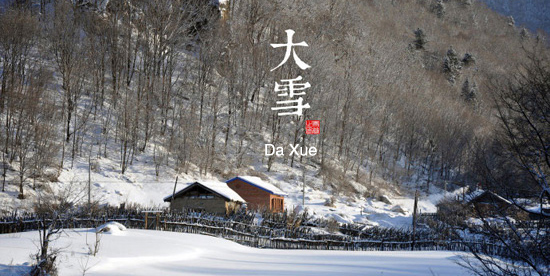The 24 solar terms: part nine

During Da Xue heavy snowfall can last whole days in the north of China.
Xiao Xue: Slight Snow
Xiao Xue, the 20th solar term, refers to the time when it starts to snow on Nov. 22 or Nov. 23 each year. During this period, the weather turns cold. Snow is light and frozen at night, but melts quickly in the daytime, and also “the lotus flower is gone and there is no rain cover in the lake. The chrysanthemums have withered while there are still some frostbitten twigs.”
After Xiao Xue, the temperature declines sharply and the air becomes dry. It is the best time to start making preserved pork. In the past, when storage conditions were poor, people created many ways to store food. Preserved pork is one of them. Thus even in the bitter winter, the whole family could enjoy meat.
Da Xue: Great Snow
The first day of Da Xue usually comes around Dec. 7, when the sun reaches 255 degrees of longitude. During this period, snow begins to accumulate on the ground. In the northern area of China, the natural scenery is “ice blockading for hundreds miles and snow flying through thousands miles,” and in the south, the snowflakes fly and the world turns white. A proverb goes “A timely snow promises a good harvest.”
In the period of Da Xue, it is bitterly cold. Lamb is the main food chosen by Chinese people during this period. It is excellent for nourishing the body, promoting blood circulation and providing protection against the cold. People in Chongqing like having Potted Lamb Soup or Stewed Lamb Soup with their families and friends. Nanjing people like to stew the lamb with yams or wolfberries to make it more nutritious.
In people’s minds, snow is always white and pure. But can you imagine there is colorful snow in the world? In 1892, there was a black snow in Italy: in the process of the snowfall, hundreds of millions of black insects flew by. As a result, they fell with snow. Norway once had a yellow snow. It was comprised of condensed pine sawdust and vapor.
